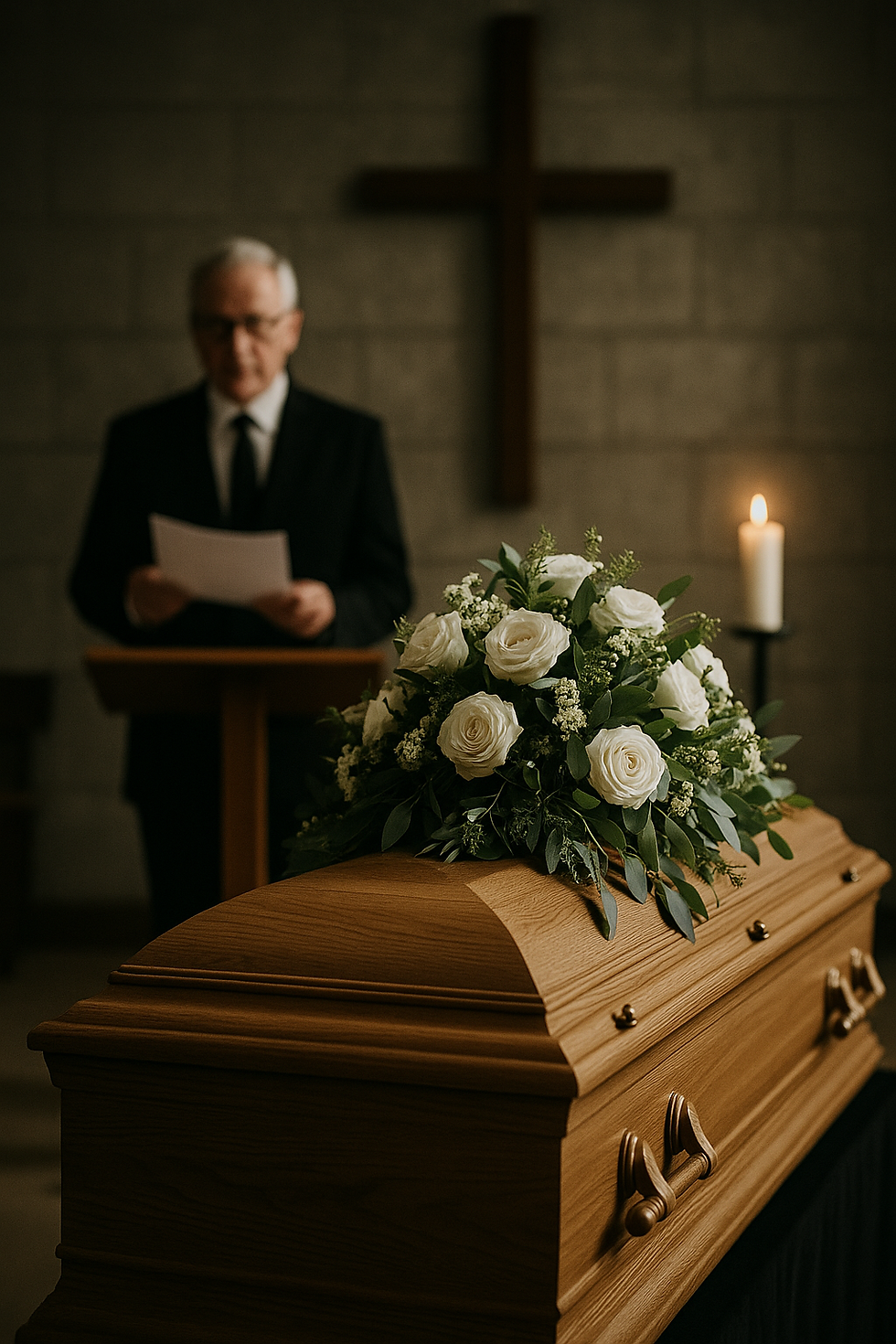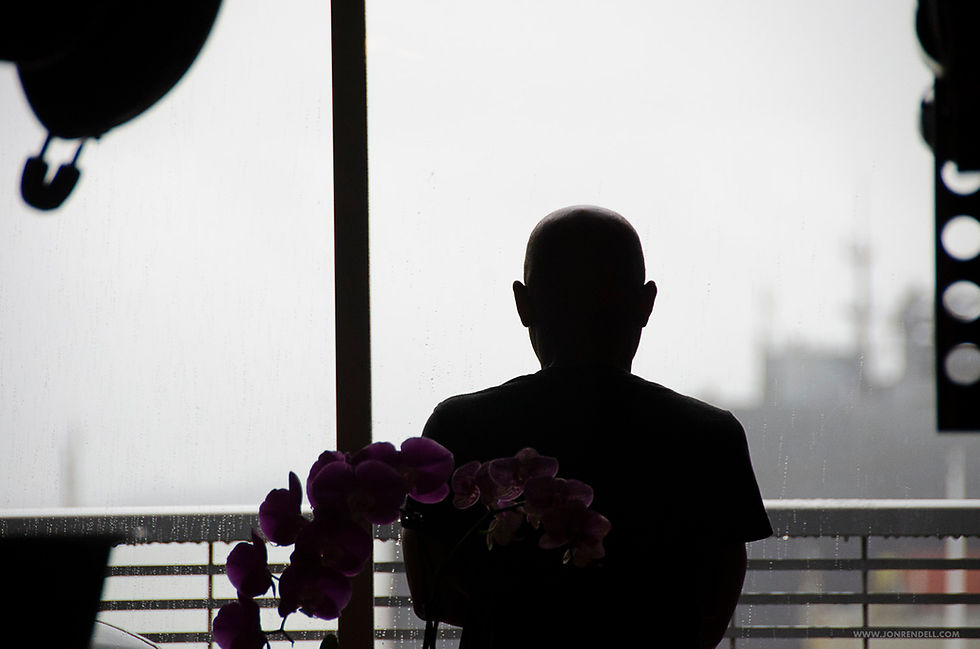People Say Kind Things at Funerals
- Oct 12, 2025
- 4 min read

We’ve all been there, sitting in a community centre, a church or funeral home, listening to people say glowing things about the dearly departed, while quietly remembering the cruel words, the manipulation, or the trail of hurt they left behind. Suddenly, the villain becomes a saint, and the truth gets buried right along with the body. Why do we do this? Why do we rewrite the story of someone’s life the moment they die? Maybe it’s politeness, guilt, denial, or maybe it’s something deeper: our desperate human need to find meaning, even in the lives that caused pain.
As a young boy I would ask my mother lots of questions whenever she made it mandatory for my siblings and me to attend the funeral of someone that everyone hated. Once she gave us that look, we knew not to ask any more questions about the horrible man or woman that made everyone's life a nightmare, including my mother's life. At a very young age I made a promise to myself to never participate by pretending to be sad when an asshole died, which was never soon enough for me.
There’s an unspoken social contract that comes alive the moment someone dies, speak kindly or not at all. The phrase “don’t speak ill of the dead” has been passed down for generations, a cultural rule meant to preserve dignity in death, no matter how someone lived. Funerals are less about the deceased and more about comforting the living. The eulogy, the flowers, the soft music, the tears, they’re designed to soothe grief, not reopen wounds. We sanitize the truth to make loss easier to bear. It’s like rewriting the last chapter of a messy book so everyone leaves the story feeling better. In my opinion, it's all a lie and never makes anyone feel better except for knowing they will never have to deal with those rude people ever again.
When someone dies, our minds tend to edit their story. We tend to remember the good because grief already carries enough pain. Psychologists call it “posthumous elevation”, our tendency to glorify the dead, even those who weren’t so glorious. Death forces us to confront our own mortality, so we respond with compassion, even when it’s unearned.
It’s also guilt. We think of what we didn’t say, or what we could have done differently. Speaking kindly gives us relief; it’s a way to tidy up emotional loose ends. Maybe that’s why we prefer to whisper, “He had a good heart,” instead of the truth: “He made a lot of people miserable, or he was a prick that everyone despised.”
Many problems can come with false kindness. The trouble is, kindness without honesty becomes a lie, and lies don’t heal. Pretending someone was good when they were not can reopen wounds for those who suffered under their cruelty. Imagine being a child of an abusive parent, sitting through a funeral where everyone praises the person who caused your pain. It’s isolating. It tells you that the world values politeness more than truth.
Sanitizing the past also rewrites history. When we smooth out the sharp edges of a person’s legacy, we erase accountability and the lessons that could have been learned from their failures. Sometimes the truth doesn’t dishonour the dead, it honours the truth itself. Speaking the truth with grace is essential. But honesty doesn’t mean cruelty. It’s possible to tell the truth with compassion. We can say, “They were complicated,” or “They struggled to love in the way others needed.” That’s still truthful and it acknowledges imperfection without malice. Every person is a mix of light and shadow and remembering both sides helps us grow. Maybe the goal isn’t to destroy their memory but to complete it and tell the whole story. In doing so, we give permission for others to heal and to be honest about their own pain.
Does any of this really matter? Funerals are more than farewells; they’re mirrors reflecting how we handle truth, grief, and forgiveness. When we lie about the dead, we also lie to the living. Real healing happens when we stop pretending every life fits neatly into a eulogy. Acknowledging complexity doesn’t take away dignity, it restores it.
Death doesn’t turn sinners into saints or cruelty into kindness. Saying nice things about someone who wasn’t nice doesn’t make us better, it just makes us dishonest. We can honour the dead without erasing the damage they left behind. The courage to tell the truth, even softly, allows everyone, especially those who were hurt, to find real closure. Because the goal of a funeral or memorial isn’t to rewrite history. It’s to release it.
And then there are people like my friend who passed suddenly this weekend, a woman whose laughter filled rooms and whose kindness never asked for attention. When we lose people like her, the words at their funerals and memorials don’t need to be rewritten. They’re simply true. Maybe that’s why loss like this hurts so deeply, it reminds us of what genuine goodness feels like. Some people move through the world leaving laughter and light in their wake. She was one of them. Her kindness didn’t need an audience, it just flowed naturally, wrapping everyone near her in warmth. Losing her so suddenly has left a space that words can’t fill. But if there’s any comfort, it’s knowing that love like hers doesn’t end, it lingers, living on in every heart she touched, especially mine.








Comments